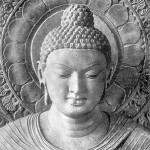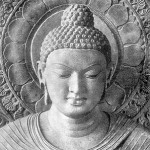The Mantra of Padma Sambhava
Padma Sambhava, often called “the second Buddha”, brought the buddhadharma to Tibet in the 8th century CE. He is also called Vajra Guru, which can translate as the Diamond Guru. His mantra is:
OM AH HUNG BENSAR GURU PAYMA SIDDHEE HUNG
It begins with OM AH HUNG, which are the seed syllables that represent body, speech and mind.
VAJRA (BENSAR or BASRA in Tibetan) means diamond, or thunderbolt, and represents the energy of the enlightened mind. The implication is that the diamond/thunderbolt can cut through anything.
GURU means wise teacher. Padmasambhava is so highly regarded in Tibetan Buddhism that he is often referred to as the second Buddha.
PADME (PAYMA or PAHME in Tibetan) signifies the radiant awareness of the enlightened mind. It calls to mind the purity of the lotus flower, which is unstained though its roots are deep in the mud.
All the perfections and accomplishments—SIDDHI—are said to be obtained through the power of this prayer.
HUNG is the heart syllable, the seed syllable of Padmasambhava. Hung is the primordial union of emptiness and form, and of Refuge and Boddhichitta. Chanting HUNG! also means “May they be bestowed upon my mindstream, this very instant!”




